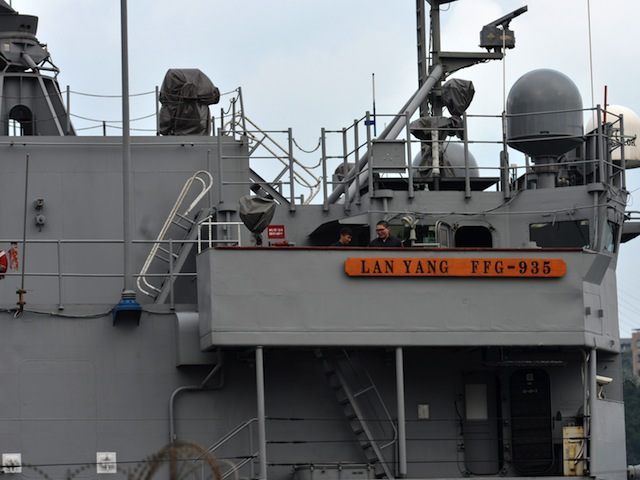This morning’s key headlines from GenerationalDynamics.com
- Russia and Ukraine escalate mutual trade sanctions over occupied Crimea
- Despite China’s disapproval, US will sell $1.83 billion in weapons to Taiwan
Russia and Ukraine escalate mutual trade sanctions over occupied Crimea

Crimean Tatars living in Turkey hold flags during a protest to call for human rights in Crimea last week, outside the Russian embassy in Ankara (AFP)
Russia on Wednesday announced plans to launch a second electric power supply cable from Russia directly to occupied Crimea.
Crimea, which was occupied and annexed by Russia last year after its invasion of Ukraine, declared a state of emergency in November after the entire peninsula was plunged into darkness because the transmission towers (pylons) carrying electricity lines from Ukraine were sabotaged. It is believed that the perpetrators were ethnic Tatars who had lived in Crimea prior to the Russian annexation. Ukraine’s government in Kiev promised to restore electricity within four days, but that was delayed because of blockades set up by the Tatars.
The Crimean Peninsula’s only land border is with Ukraine, which means that Russia cannot use trucks to transport goods from Russia to Crimea. However, Russia’s territory of Krasnodar has its own peninsula that stretches into the Black Sea, below the Sea of Asov, so that it is only a few miles across the Kerch strait to the eastern edge of Crimea. So Russia is building its electric cables across the Kerch strait, and has also been ferrying supplies in the same way.
Since Russia annexed Crimea last year, Ukraine and Russia have been in tit-for-tat escalating sanctions with each other. Russia has announced an embargo on food imports from Ukraine, to begin in January. Ukraine announced that it was planning to end all commercial trade with occupied Crimea, and this week on Wednesday, Ukraine officially announced that in 30 days, “all supplies of work, goods and services from the temporary occupied territory to the other territory of Ukraine and/or from the territory of Ukraine to the temporary occupied territory of Ukraine, except for personal belongings of citizens, socially important foods and humanitarian assistance, are banned.”
After the electricity supplies from Ukraine to Crimea had been cut off, there were warnings that Russia might retaliate by halting coal shipments from Russia, resulting in winter blackouts all over Ukraine. Some observers are suggesting that a secret backroom deal occurred — Ukraine would resume electricity supplies to Crimea in exchange for resumed Russian coal shipments to Ukraine. Jamestown and Russia Today and International Business Times and Reuters
Despite China’s disapproval, US will sell $1.83 billion in weapons to Taiwan
The United States announced the sale of $1.83 billion in weapons to Taiwan, under the terms of the 1979 Taiwan Relations Act, which was passed to ensure that Taiwan can maintain a credible defense in case of an attack from China.
The timing of the announcement is interesting for two reasons.
First, tensions between the US and China in the South China Sea have been increasing. China has claimed the entire South China Sea, and is annexing regions that have historically belonged to other nations. China appears to be in the process of building a massive military base on artificial islands, and the US and other countries have been confronting China simply by sailing and flying in the vicinity of the artificial islands, which are considered international waters, despite loud and aggressive Chinese warnings not to do so.
Second, Taiwan is about to hold new elections on January 16, and the current governing party, the pro-China Kuomintang (KMT) party, is expected to lose to the pro-independence Democratic Progressive Party (DPP). According to China, Taiwan is Chinese sovereign territory, and China has frequently threatened military action if Taiwan’s leaders take any steps towards independence from China. China and the KMT party are very friendly towards each other, while China and the DPP feel vitriolic hatred towards each other.
In view of the expected change of government, it is thought that the US announced the arms sale now, since after January 16 it would be seen as a hostile signal to China that the US was rewarding the DPP for its victory.
Even so, China expressed its fury at the arms sale. China’s Vice Foreign Minister Zheng Zeguang on Wednesday summoned Kaye Lee, chargé d’affaires of the U.S. embassy in China, and made this statement:
Taiwan is an inalienable part of China’s territory. China strongly opposes the U.S. arms sale to Taiwan.
The arms sale severely goes against international law and the basic norms of international relations, severely goes against the principles in the three China-U.S. joint communiques, and severely harms China’s sovereignty and security interests.
To safeguard our national interests, China has decided to take necessary measures, including imposing sanctions against the companies involved in the arms sale.
No one can shake the firm will of the Chinese government and people to defend their national sovereignty and territorial integrity, and to oppose foreign interference.
However, according to one Chinese expert, the weapons will not make any substantial change because the weapons are outdated. LA Times and Xinhua
KEYS: Generational Dynamics, Russia, Ukraine, Crimea, Tatars, Krasnodar, Kerch strait, China, Taiwan, 1979 Taiwan Relations Act, KMT, Kuomintang, DPP, Democratic Progressive Party, Zheng Zeguang, Kaye Lee
Permanent web link to this article
Receive daily World View columns by e-mail

COMMENTS
Please let us know if you're having issues with commenting.